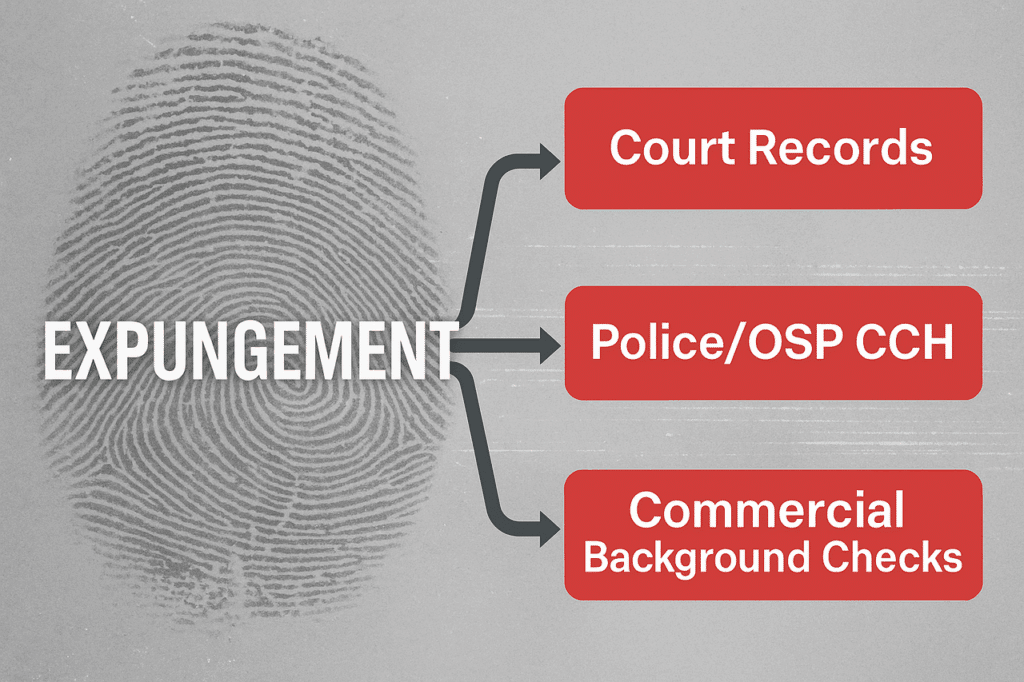Why Expunged Records Still Show Up on Background Checks

Not all expungements are done the same. People often believe expungement or set aside means a criminal record disappears. In practice, that only happens if every version of the record is cleared. There are at least three systems that store and share criminal history, and each has its own process for adding and removing records. Unless all three are addressed, what is expected to be removed may still show up on a background check.
Three Systems Where Criminal History Lives On
Court records
The first system is through the court records and all the records that flow from the court. This is what appears in the Oregon Judicial Department eCourt system or what a clerk can pull at the courthouse. When a judge signs an order setting aside or expunging a case, the court seals the file and removes it from public access. That order usually manages to clear the court’s records, but it does not automatically remove arrest data or entries in police and other databases.
Police fingerprint-based CCH system
The second system is kept by the police and generally referred to as the Computerized Criminal History, or CCH. This is the fingerprint-based criminal history kept, accessed, and maintained by law enforcement, district attorneys, and some other government agencies. Every arrest and jail booking that results in fingerprinting will create a new CCH entry, even if the case is later dismissed or never charged in court. Dismissed and no-charge arrests do not disappear from the CCH on their own — they remain until a court orders them set aside. Commonly, a set aside order will provide enough information for the Oregon State Police to remove the entire record related to a criminal event.
A proper expungement should generally identify the fingerprint numbers, or FPN, related to a case. A single case often has multiple FPNs associated with it. A thorough expungement will list each FPN so agencies can identify and remove all records related to the case. We have seen as many as seven FPNs associated with a single case. Court-based expungements that did not use a fingerprint governmental background check to prepare the filings do not have that information and are often insufficient to clear an entire case record.
Commercial/third-party databases
A third system is commercial, or third-party background checks. These are companies that collect and resell public record data to employers, landlords and websites. These for-profit companies buy and store data from many sources. Even after a court seals a record and the government clears the CCH history, these private databases may still show old information until they are notified to remove it.
How Commercial Background Check Errors Impact You
There is also a difference between what shows up on a background check and what can be used in criminal history scoring. Oregon’s sentencing rules allow only qualifying convictions to count against a defendant in determining criminal history. Arrests, dismissed charges, and cases that have been set aside do not count toward that score.
Firearm rights are an important aspect of expungement. A person’s ability to possess or purchase a firearm can depend on more than whether a conviction has been set aside. If firearm rights are of concern, it is important to speak with an attorney who has specific experience in civil rights restoration.
Questions to Ask Your Expungement Lawyer
- Will your set aside filing be supported by a fingerprint-based background check obtained and reviewed by your attorney?
- Does your attorney draft the proposed order for the judge, or leave it to the court to prepare its own?
- Will your attorney take steps to clear third-party or commercial background databases after the court order is signed?
- After the case is set aside, does your attorney verify police agency removal through a fingerprint-based verification background check?
The Lohrke Difference: Choosing the Right Expungement Attorney in Eugene, Oregon
Lohrke Law works to remove records from all three systems. We provide set aside documents that are customized for each case and which are tailored to clear all three layers of records. We prepare orders that direct the Oregon State Police and other agencies to seal the whole CCH record tied to the case. We then verify the agencies did their jobs by running multiple background checks during our representation. We also send legal demands to major background check companies to remove our client’s records from their databases.
This multi-pronged approach accounts for the several ways that information about you is distributed.
We have been doing expungement and set aside work for more than a decade. We are often consulted when an expunged case still appears on a background check and people are faced with the embarrassing decision of how to explain why a criminal record appeared when they stated one would not. Our goal is to make sure that never happens to you. That is why our process is designed to work through multiple systems and clear records from the courthouse to the police to private reporting systems.
